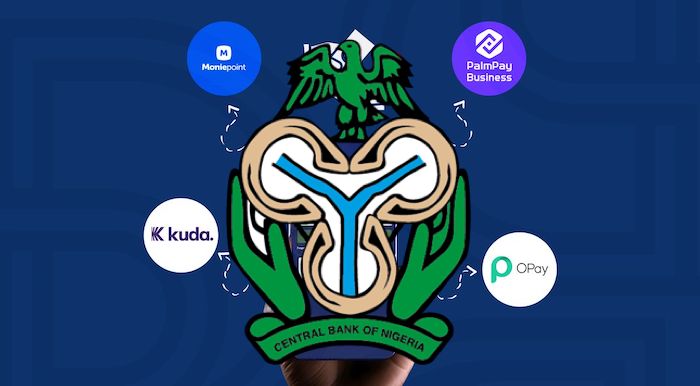The Central Bank of Nigeria (CBN) has barred four Fintech companies to suspend opening new accounts for customers until further notice.
The affected fintech firms which are OPay, Palmpay, Kuda Bank, and Moniepoint, have come under scrutiny due to allegations of their accounts being utilised for illicit foreign exchange transactions.
According to reports, representatives from two of the companies acknowledged that the CBN’s directive is connected to these allegations.
However, they expressed concerns that the directive might be misdirected, highlighting that the majority of the implicated accounts are held by commercial banks rather than Fintech platforms.
Also read
- Know Fake loan Apps blacklisted by CBN
- CBN Gives OPay Approval For International Money Transfer
- Some Of Our Signature Industries Have Become Comatose, A’Ibom NLC Alarms
It was reported that the Economic and Financial Crimes Commission (EFCC) had obtained a court order to freeze at least 1,146 bank accounts owned by individuals and companies allegedly involved in illegal foreign exchange transactions.
Justice Emeka Nwite, in a ruling on the ex-parte motion presented by the anti-graft agency’s lawyer, Ekele Iheanacho, granted the commission’s request to conclude the investigation within 90 days.
Although the verdict was issued on April 24, its certified true copy was provided on Monday, April 29.
The EFCC is also investigating other offences, including money laundering and terrorism financing.
An examination of the list of affected accounts reveals that the majority are deposit money bank accounts.
The EFCC stated in its request for the account freeze that its preliminary investigation indicated the accounts were linked to individuals exploiting virtual crypto currency exchange platforms to manipulate the Naira’s value illegally and launder proceeds from unlawful activities.
It cited the necessity to preserve the funds in the identified accounts pending the investigation’s conclusion and potential prosecution.
Despite a court order citing most of the accounts involved in alleged illegal Forex trading as commercial bank accounts, the banks have not been instructed to halt new customer’s on boarding.
As of Monday evening, Naira traded at N1350 against the dollar, which is a regression against the steady climb that the Nigerian currency has made over the past few weeks as it traded to N950 in early April.
Following the drastic depreciation of the naira in February which nearly exchanged at N2000 to a dollar, the CBN, in collaboration with the anti-graft commission, EFCC, cracked down on Binance and detained its executive Tigran Gambaryan, a U.S. citizen and British-Kenyan Nadeem Anjarwalla over accusations of naira manipulation.
The Nigerian government demanded that Binance release the names of its top 100 users and their transactions to negotiate the release of the detained executives.

